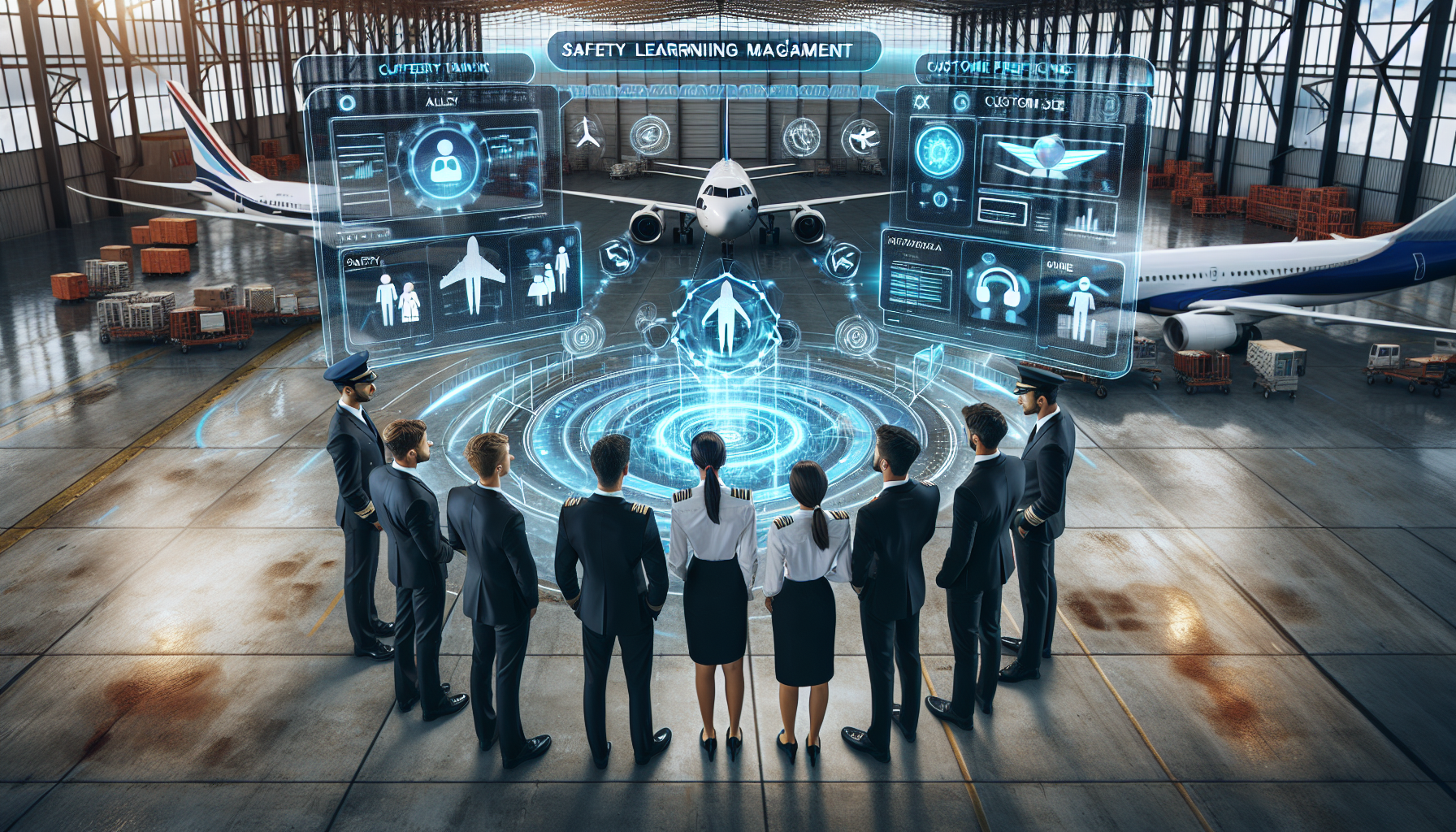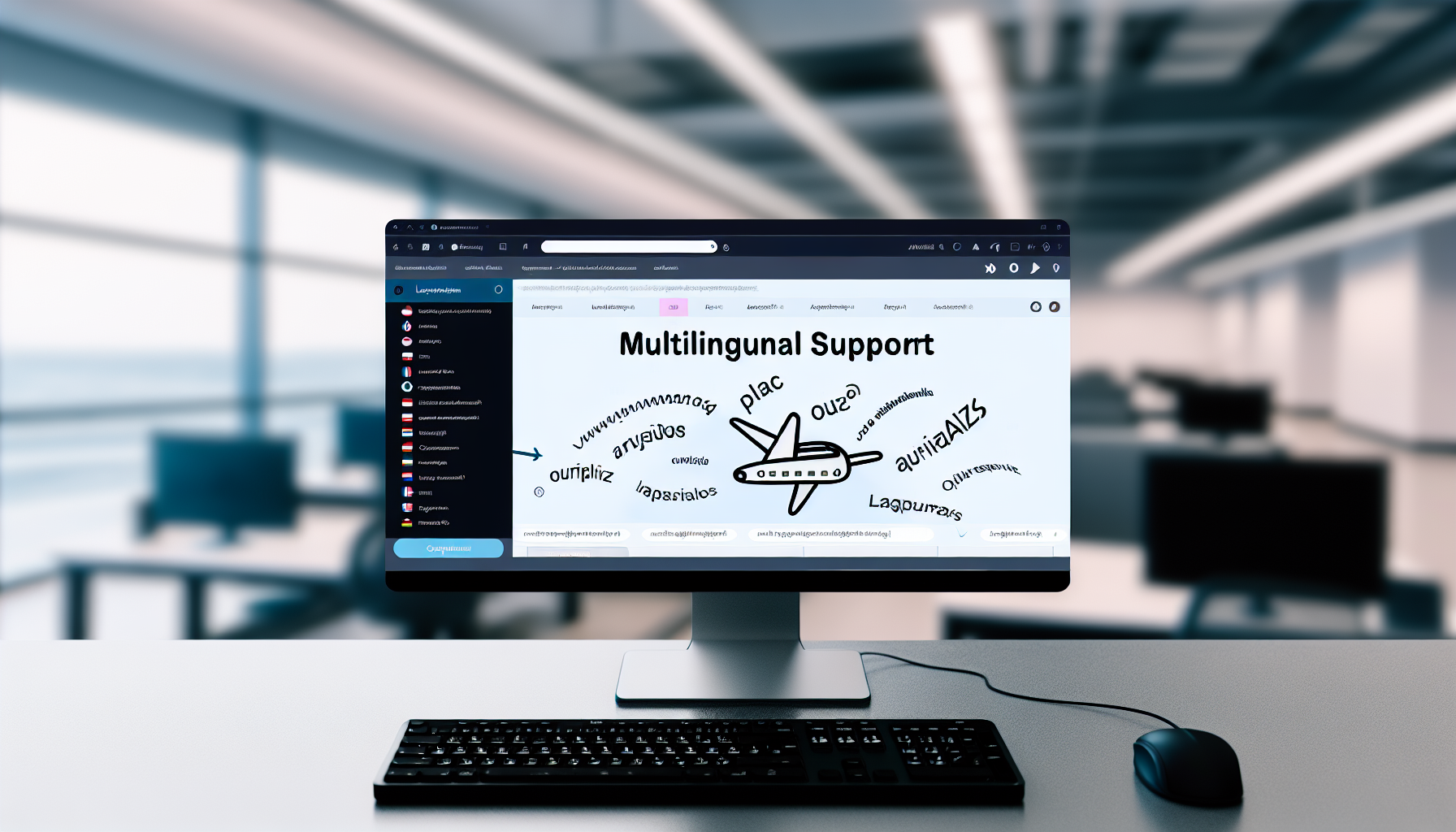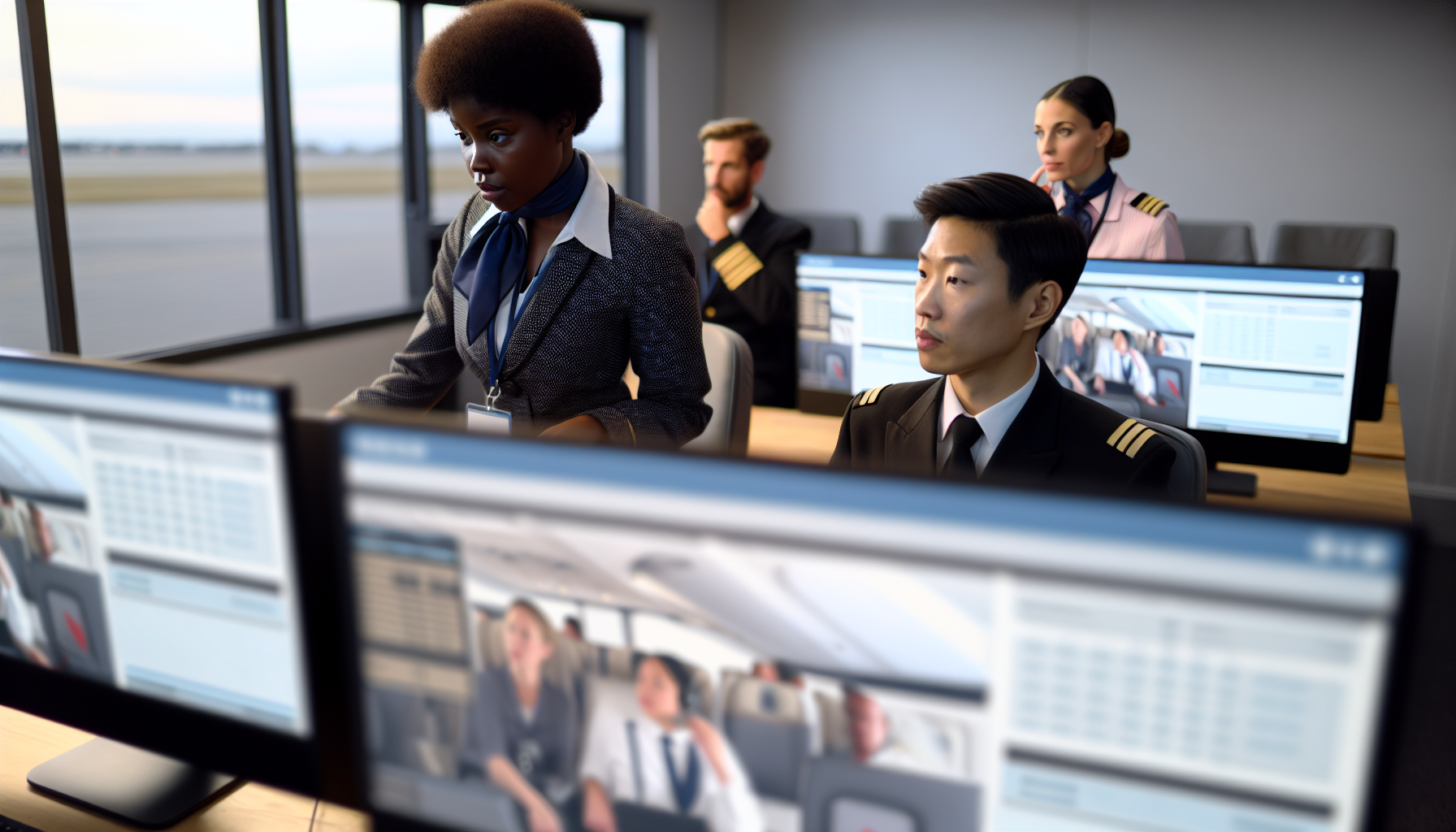In the fast-paced world of aviation, airlines are on a perpetual quest to optimize training and operations. The solution? A specialized Learning Management System (LMS). But with numerous options available, identifying the best LMS for airlines can be a challenge. An ideal LMS empowers your airline with streamlined onboard training for staff, comprehensive progress reporting for managers, and customizable content for varied workforce needs. This article explores the key features, benefits, and cost-saving potentials of implementing an LMS tailored to the dynamic realm of air travel.
Key Takeaways
- A Learning Management System (LMS) enhances aviation training by providing immersive content for safety and conflict resolution, fostering quick decision-making capabilities, and allowing continuous learning opportunities regardless of location or time.
- LMS platforms streamline aviation training and compliance management by offering multilingual support, customizable paths for diverse workforce needs, and advanced reporting features for informed decision-making and skill gap analysis.
- Aviation-specific LMS tools enable cost-effective training solutions by reducing expenses related to traditional training methods, supporting environmentally friendly practices, and providing engaging training experiences that improve retention and job performance.
Elevating Training Efficiency in Airlines with LMS

A key player in enhancing aviation training is the Aviation Learning Management System (ALMS). These digital platforms focus on providing safety training that aids employees in managing challenging situations, thereby ensuring passenger safety. They offer immersive and engaging content, particularly vital for conflict management and resolution skills within aviation personnel.
Quick decision-making and handling complex scenarios are fostered by performance-based learning deployed via LMS. This approach not only enhances efficiency but also reduces costs linked to errors or accidents. Furthermore, LMS enables continuous learning and development opportunities in the aviation industry by customizing content and deploying training programs independent of location, time zone, or language.
Operating advanced airline systems and technology requires the technical proficiency enhancement provided by an LMS through performance-based learning.
Streamlining Onboarding for Airline Personnel
Aviation personnel greatly benefits from the flexible access to training material offered by an LMS. These professionals are often globally distributed or traveling, and an LMS allows them to receive training anytime and anywhere. Furthermore, e-learning solutions provided by an LMS reduce the complexity of administrative tasks, enhancing overall efficiency for aviation training administrators.
Aviation-specific LMS platforms deliver ready-to-use onboarding courses that can be easily customized to fit an airline’s unique processes and protocols. Incorporating assessments and quizzes in the onboarding process through LMS ensures that new hires have a clear understanding of their role and job expectations. The automation of onboarding training through an LMS accelerates the familiarization with industry standards and company culture, reducing onboarding time by up to 60%.
Advanced Reporting for Informed Decision Making
Another significant aspect of aviation LMS platforms is advanced reporting. Real-time tracking of trainee progress, such as that offered by Butterfly Training LMS, aids in comprehensive reporting on training completion. These customizable dashboards enable managers to quickly view key training metrics for prompt decision-making.
Management can receive timely reports on the learning patterns and progress of aviation staff, thanks to built-in analytics tools like those provided by MapleLMS. These tools are crucial for creating detailed reports on employee progress and performance, essential for compliance and certification tracking, as well as to track employees training activities.
Additionally, compliance management features within an LMS track individual skill gaps and maintain robust records, facilitating audit processes.
Customizing Courses for Diverse Workforce Needs
By offering personalized training, LMS platforms cater to diverse workforce needs, enabling aviation personnel to progress at their own pace, choose their preferred training activities, and follow learning pathways unique to their roles and goals. This is particularly relevant for a global and diverse aviation workforce, where multilingual training capabilities are essential for effective learning.
An LMS also facilitates the creation of specific learning paths for aviation staff, allowing them to understand the necessary steps for career advancement within the airline. Moreover, modern LMS platforms provide the flexibility for airline employees to access training materials on various devices, accommodating training needs across different locations and for personnel who are frequently on the move.
Key Features of an LMS Tailored to Airline Operations

To successfully meet the diverse and dynamic needs of the aviation industry, a suitable LMS must have some key features. It must offer:
- Multilingual support
- Responsive design to accommodate training on various devices
- Customization options to create distinct training portals for different groups within an airline, such as maintenance crews, pilots, and cabin staff
These features are essential to reflect the global nature of aviation operations and the dynamic environments in which personnel work.
To ensure effective tracking and interoperability of training activities, an aviation LMS should have the following features:
- Support for industry-specific eLearning standards like SCORM, Tin Can API (xAPI), AICC, and IMS LTI
- Adaptive learning paths that adjust to a learner’s progress and performance
- Just-in-time training for immediate application
These features are essential in an aviation LMS for aviation companies to address their aviation training needs.
Furthermore, to engage aviation professionals and reinforce training concepts, an LMS should include gamification elements such as badges, points, and the simulation of real-life scenarios.
Delivering Engaging Online Training Courses
Gamification features like badges and points in aviation LMS platforms maintain learner engagement and motivate employees to excel in training. Additionally, multimedia support, including videos, simulations, and interactive scenarios, is crucial in engaging online courses, ensuring to deepen knowledge retention.
Aviation LMS platforms offer the following benefits:
- Personalized training experiences with different learning paths tailored to individual roles or skill levels
- Combination of live classes with recorded videos and interactive content tools
- Support for flexible learning that is accessible anytime and anywhere
Compliance Management Made Simple
Robust compliance management features are provided by Learning Management Systems tailored for aviation, like AvLMS and SAP Litmos. These tools help airlines ensure adherence to stringent industry regulations and safety protocols. Using an LMS with easy content management features ensures that aviation training materials are always updated with the latest regulations and procedures.
Airlines can also utilize the built-in reporting and analytics of an LMS to monitor learner progress and performance, assisting in optimizing training programs and removing ineffective training modules. An LMS also enables airlines to provide consistent onboarding experiences for new employees, ensuring crucial safety and operational information is uniformly distributed regardless of the employee’s location.
Flexible Learning Across Time Zones
To enable continuous learning and professional development, Aviation LMS platforms provide flexibility for employees to access training materials from any location. An LMS designed for airline operations facilitates the deployment of training resources on a global scale, ensuring consistent training regardless of location or time zone.
Features like real-time data integration, mobile-friendlinesscus, and geolocation support enhance the learning experience by providing accessible training content according to the learner’s location and time zone. Learning Management Systems also allow for quick organization of training sessions at lower costs, especially beneficial for airlines with employees distributed globally and in different time zones.
Cost-Effective Training Solutions for Airlines
By minimizing expenses related to travel, printing, and venue rentals, an LMS significantly reduces traditional training costs for airlines. These systems also help airlines improve resource allocation and manage data efficiently, leading to further cost reductions.
Moreover, LMS for aviation support environmentally friendly practices by decreasing the need for printed materials through offering online training and resources. The flexible and powerful eLearning environments provided by LMS accommodate diverse training needs cost-effectively and at scale, enhancing the overall cost-efficiency for airlines.
Reducing Training Costs While Maximizing Impact
The usage of eLearning assessment tools encouraged by Learning Management Systems can provide several benefits, including:
- Reducing the evaluation process time and costs compared to traditional methods
- Offering personalized learning paths which enhance learner experience and satisfaction
- Leading to better knowledge retention and engagement
Boosting employee job satisfaction through timely and dynamic training with an LMS can lead to increased retention and improved job performance in the aviation industry. Multilingual support, with platforms like Paradiso LMS offering over 75 languages, ensures all personnel receive equal quality instruction, accommodating the diverse workforce needs.
ROI of Implementing an LMS in the Airline Industry
Airlines can save up to 70% compared to traditional classroom training by eliminating transportation costs and facilitating on-demand individual learning with online training platforms like Butterfly Training LMS. An LMS equipped with simulation-based training tools can significantly improve pilot efficiency and decrease the probability of costly operational mistakes, as they deliver training effectively.
The use of an LMS enables:
- Rapid content updates in the ever-changing aviation industry, cutting down the expenses involved in reprinting and redistributing physical training materials
- Streamlining the tracking and recording of training sessions, offering considerable cost savings in meeting compliance and certification requirements for airlines
- Shifting the role of training managers or instructors towards facilitation, leading to more cost-effective training processes and enhancing the overall return on investment for airlines.
Enhancing Customer Service Training with LMS

Through employee training, employees can effectively handle a wide range of customer scenarios using customized courses for customer service training provided by online learning management systems. LMS platforms often incorporate gamification features such as badges and achievements, along with interactive elements like polls and leaderboards. These features keep airline customer service staff engaged, motivated, and satisfied during training.
Aviation LMS systems support diverse learning methods for customer service training, including:
- Computer-aided instruction
- Video assistance
- Live classes
- A library of recorded videos for practical demonstrations.
Role-Specific Training for Enhanced Passenger Interaction
Specialized training tailored for roles such as flight attendants and gate agents is facilitated by aviation LMS platforms. This focuses on the unique challenges and complexities of passenger interaction.
Conflict Management and Resolution Training
Learning Management Systems support the inclusion of eLearning assessment tools that can evaluate the proficiency of airline staff in conflict management and resolution. Conflict resolution training through LMS can be enhanced by using gamification features such as badges and leaderboards to motivate airline personnel and reinforce their learning.
Development Opportunities Through LMS
Aviation professionals can keep up with industry changes and advance their skills, contributing to their career progression, thanks to LMS. Aviation professionals report higher job satisfaction due to the personalized learning and career development opportunities provided by LMS platforms.
LMS also offers a variety of professional development courses and certifications accessible by aviation staff, facilitating continuous learning and advancement.
Continuous Professional Development Programs

To enhance the practical skills of flight crews, modern LMS solutions in aviation include the development of various flight scenarios, from adverse weather to hijack situations. They also incorporate live and recorded video sessions, accommodating different learning preferences such as visual and auditory styles.
Blended learning approaches supported by LMS, like computer-aided instruction combined with video sessions, provide comprehensive training experiences for aviation professionals. Personalized role-specific training through an LMS leads to increased job satisfaction among airline staff and improved delivery of customer service.
Social learning features integrated in aviation LMS platforms, such as forums and communities, encourage peer interaction and collaborative knowledge sharing. Gamification elements within LMS, including badges, points, and achievements, are designed to keep aviation professionals continuously engaged and motivated in their learning.
Leadership and Management Training Paths
Aviation professionals can enhance organizational performance by learning how to articulate and implement solid business strategies through an LMS. They can also improve efficiency by equipping leaders with the necessary skills for running critical projects and operations.
An LMS provides tools and best practices for aviation managers to handle training needs and improve their instructional techniques through a well-designed training program.
Summary
Summarize the key points of the article and end with a phrase that will inspire the reader.
Frequently Asked Questions
What is LMS in airline industry?
In the airline industry, LMS refers to a learning management system that helps companies offer ongoing training and development for employees to adapt to changing needs and stay updated with safety and regulatory standards.
What is airline flight operation management?
Airline flight operation management involves ensuring the safe, efficient, and on-time operations of an airline’s flights, keeping everything running smoothly.
What is LMS 360 training?
LMS 360 training refers to a Learning Management System platform that simplifies workforce training processes, from enrollment to performance tracking, making it effortless to manage. It emphasizes the design and implementation of pedagogical strategies to achieve learning outcomes.
What is LMS safety training?
LMS safety training refers to the use of Learning Management System (LMS) to provide access to a catalog of workplace health and safety videos, along with online assessments to track engagement. This allows for the implementation of pedagogical strategies to achieve learning outcomes in safety training.







